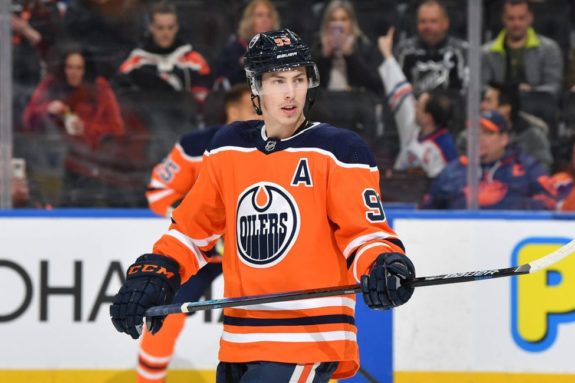The Edmonton Oilers made a big offseason move, locking in their longest-tenured player, Ryan Nugent-Hopkins, to an eight-year deal worth $41 million. This deal will see Nugent-Hopkins’ contract expire at the age of 36 and it comes at a very respectable cap hit of $5.25 million per season which makes this deal hard to criticize.
While general manager Ken Holland did have to sacrifice term in order to lower the AAV on the deal, the most important thing to note is the full no-movement clause. This means that there are ramifications in terms of how this deal affects the Oilers’ plans for their player protection lists with the expansion draft looming, and this signing may make the decision that much easier.
Expansion Draft Qualifications
The Seattle expansion draft will be following the same format and guidelines as the Vegas expansion draft, meaning NHL teams will have to decide to use the 7 forwards, 3 defenseman, and 1 goaltender protection format, or the 8 skaters and one goaltender method.

This also means that any player with a no-movement clause is forced to be protected by their current NHL team, or will have to waive their no-movement clause in order to be left unprotected for the expansion draft. This rule drastically changes the Oilers’ protected list outlook because Nugent-Hopkins now falls into this category.
Potential Protected List Prior to Nugent-Hopkins Signing
It was a somewhat questionable decision for Holland to sign Nugent-Hopkins ahead of the expansion draft rather than waiting to make the deal official until after the expansion draft in order to preserve a protected player slot. However, the Oilers do not lose much by making this signing official sooner considering many of their rostered forwards are free agents and are easily replaceable.
| Oilers Projected Forward Protection List with Nugent-Hopkins |
|---|
| Connor McDavid |
| Leon Draisaitl |
| Jesse Puljujarvi |
| Kailer Yamamoto |
| Jujhar Khaira |
| Josh Archibald |
| Zack Kassian/Kyle Turris/Devin Shore |
The Oilers protected list looked slightly different before the Nugent-Hopkins signing because he did not need to be protected as a free agent. While Seattle could select an unrestricted free agent, the risk involved of the player not signing with the team and subsequently leaving remains high and, in turn, is not a wise decision for an expansion team to make.
Related: Oilers Need to Address Their Goaltending This Offseason
Without Nugent-Hopkins, the team could utilize the extra spot to protect one of Kyle Turris, Zack Kassian, or Devin Shore, although some may argue that it would be wise to leave Kassian exposed to potentially get rid of his contract. Turris or Shore would be the more likely selections considering they’re both on team-friendly deals, with the edge going to Turris because of his track record despite his struggles last season.

This left the Oilers with the ability to protect more of their depth players, although some may not be deserving of being protected based on their recent play. This scenario also allowed the Oilers to leave more of their bad contracts exposed in order to possibly have them selected and gain cap flexibility.
Potential Protected List After Nugent-Hopkins Signing
As mentioned before, the signing has a strong impact on the Oilers’ protection list because Nugent-Hopkins will now have to occupy one of the team’s forward spots. This means that the Oilers will need to be slightly more calculated in their decision-making process. Nugent-Hopkins remaining with the team gives Holland more certainty heading into the offseason of what the team’s needs are and also more precise numbers to work with in terms of their available salary cap.

With Nugent-Hopkins now back into the fold, the potential protection list that the Oilers could go with leading up to the expansion draft is shown in the chart below. The Oilers do not have too many players outside of this list that they would be concerned to lose come the expansion draft, which leaves them in a good position moving forward.
| Oilers Projected Forward Protection List with Nugent-Hopkins |
|---|
| Connor McDavid |
| Leon Draisaitl |
| Ryan Nugent-Hopkins |
| Jesse Puljujarvi |
| Kailer Yamamoto |
| Jujhar Khaira |
| Josh Archibald |
While this projected list is subject to change and could also include Kassian as a potential keeper at the forward position, the Oilers don’t have too many tough decisions to make in terms of their forwards with Nugent-Hopkins involved. The only players that are omitted from this list that could have been kept if Nugent-Hopkins didn’t sign an extension are Turris, Dominik Kahun (who was not tendered a qualifying offer), James Neal, and Shore, none of which would be cause for concern if they were taken by Seattle. This also allows Holland to explore potential trades to help create flexibility without having to balance the uncertainty surrounding Nugent-Hopkins in free agency.
Aggressive Offseason Approach
With much of the Oilers forward core now returning they can turn their attention to addressing what to do with the contracts of Neal, Kassian, and Mikko Koskinen, and figure out ways to try and get them off the organization’s books. Holland can shift his focus to addressing the team’s depth forward corps, bolstering the defense, and trying to solidify his crease, which should make him one of the more active general managers heading into the offseason.

With the protected players list becoming more certain for Holland and the Oilers, they can become more active in trade discussions surrounding players who they may not be able to protect. This should open up more ways to shed money in order to use it to spend on the free-agent market.
Narrowing the Protection List
While no one knows for sure where Holland stands in terms of his protection list, the Nugent-Hopkins signing helps provide a little more clarity on the situation. The certainty of this signing also makes transactions easier to make because the team’s cap situation has also become clearer heading into the offseason. Although nothing has been finalized in terms of the protection list, we know that the Oilers don’t look to be losing anything too significant from their forward group and should be able to replace anything they lose in-house or via free agency.